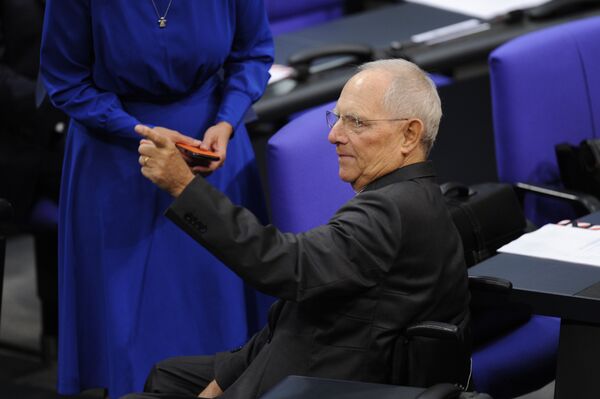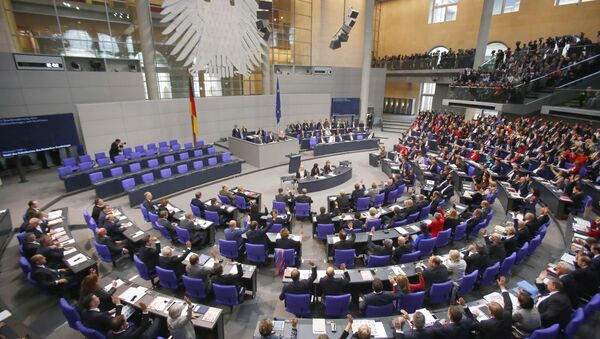The Bundestag convened October 24 for the first time since September 22, following the general election. It will be its largest size ever — in total, 709 Mitglieder des Bundestages (Members of Parliament) will sit in the chamber compared to 631 in the previous parliament.
Due to the return of the Free Democracts (FDP) for the first since time since 2013, and the arrival of Alternative for Germany (AfD), it will consist of six parties for the first time since 1957.
Mixed Diversity
In demographic terms, female MPs were the biggest losers of the September 24 Bundeswahl, and the percentage of women (31 percent which is 219 seats) in parliament is the lowest it's been in almost two decades, a more than six percent drop from the previous parliament. As a result, Germany lags behind its major European cousins the UK (32 percent) and France (39 percent).
Interesting stat, % of women in Bundestag lowest of any election since 1994 pic.twitter.com/pH33ujbO85
— DANGER slug 🕸🕷👻 (@a_balden) October 24, 2017
Female representation in all parties has fallen, with the exception of the Greens. Chancellor Merkel now leads a party dominated by men, with less than 20 percent of Christian Democrats women, while the embattled SPD sends 64 women to the Bundestag, out of 153 MPs. Women are a majority only in the Left Party (53.6 percent) and Greens (60.9 percent).
Conversely, 58 MPs (eight percent) aren't fully German, in ethnic terms — either they weren't born in Germany, or have a parent who wasn't. Most sit with left-wing parties — 10 percent of SPD members, 15 percent of the Greens and 19 percent of the Left. The share is smallest in the CDU (under three percent).
The anti-immigration AfD, has eight "emigrants" among its 92 parliamentarians, including one born in Italy, two in Romania, two from the former Czechoslovakia, two from Kazakhstan and a German with an African-American father.
Old and Grey
The new Bundestag is only slightly younger than the outgoing one, with an average age of around 50 — 51.5 percent are in the 45-to-59 age range. Voters aged 18-to-29 are significantly underrepresented, with only 13 MPs (1.83 percent of the chamber) under 30. The FDP has an average age of 45.5, the Greens 47. The CDU, Left and SPD are each about 50 years old on average.
Moreover, many MPs are "old" in that they are returning — around 60 percent of MPs held onto their seats. The CDU/CSU and SPD have the fewest new members.
Conversely, by definition, the AfD's 94 MPs are all-new. As every party has refused to support legislation they propose, AfD MPs will be forced to utilize parliamentary queries and kickstart debates to initiate discussions on their core issues — refugees, law and order, and the "Islamization" of Germany.
Moreover, their parliamentary standing grants the party privileges such as chairing committees, and appointing a Bundestag vice president. The AfD intends to nominate 72-year-old Albrecht Glaser, who has proposed Muslims should not enjoy freedom of religion in Germany as Islam is a political ideology, not a faith. Other parties have indicated they will not approve his nomination.
Other AfD members have also made national headlines — 28-year-old Sebastian Munzenmaier was convicted of being an accessory to assault in a football hooliganism case in September, whilst former soldier Martin Reichardt is on record as supporting the notion of "Germany for the Germans," a phrase oft-used by neo-Nazi groups, and Wilhelm von Gottberg has said the Holocaust is a "myth" and an "effective instrument to criminalize" Germans and their history.
77 year old former policeman Wilhelm von Gottberg described the Holocaust as a “myth” used to “criminalize” Germans https://t.co/3QZHWip6Mv
— Tina Lee (@tinaleeinberlin) September 26, 2017
Jens Maier, a judge from Dresden, has frequently cautioned against the "creation of mixed nationalities" on the basis they "destroy national identity," and called for an end to Germany's "culture of guilt" surrounding the Second World War. Alexander Gauland has suggested the government's commissioner for integration, Aydan Ozoguz, should be "disposed of" for suggesting there was no specifically German culture beyond the German language. His colleague Alice Weidel also rained incendiary rhetoric down on Ozoguz, calling her a "stain" and "disgrace."
One elected AfD member won't be joining the party in parliament, however — Frauke Petry, long the effective public face of the AfD, quit shortly after the Bundeswahl — although she'll still sit in the chamber, as an independent.
Toeing the Line

Wolfgang Schauble, former Finance Minister and now Bundestag President, will be charged with keeping the Bundestag's parties in line — if any MPs disrupt proceedings, he can levy punishments such as being called to order, or being banned from parliamentary discussions for a period of time.
While many predict the AfD will be a highly disruptive presence in the chamber, the AfD have spent two-and-a-half years in Saxony's state parliament, and during that time only one of the party's deputies has been called to order.



